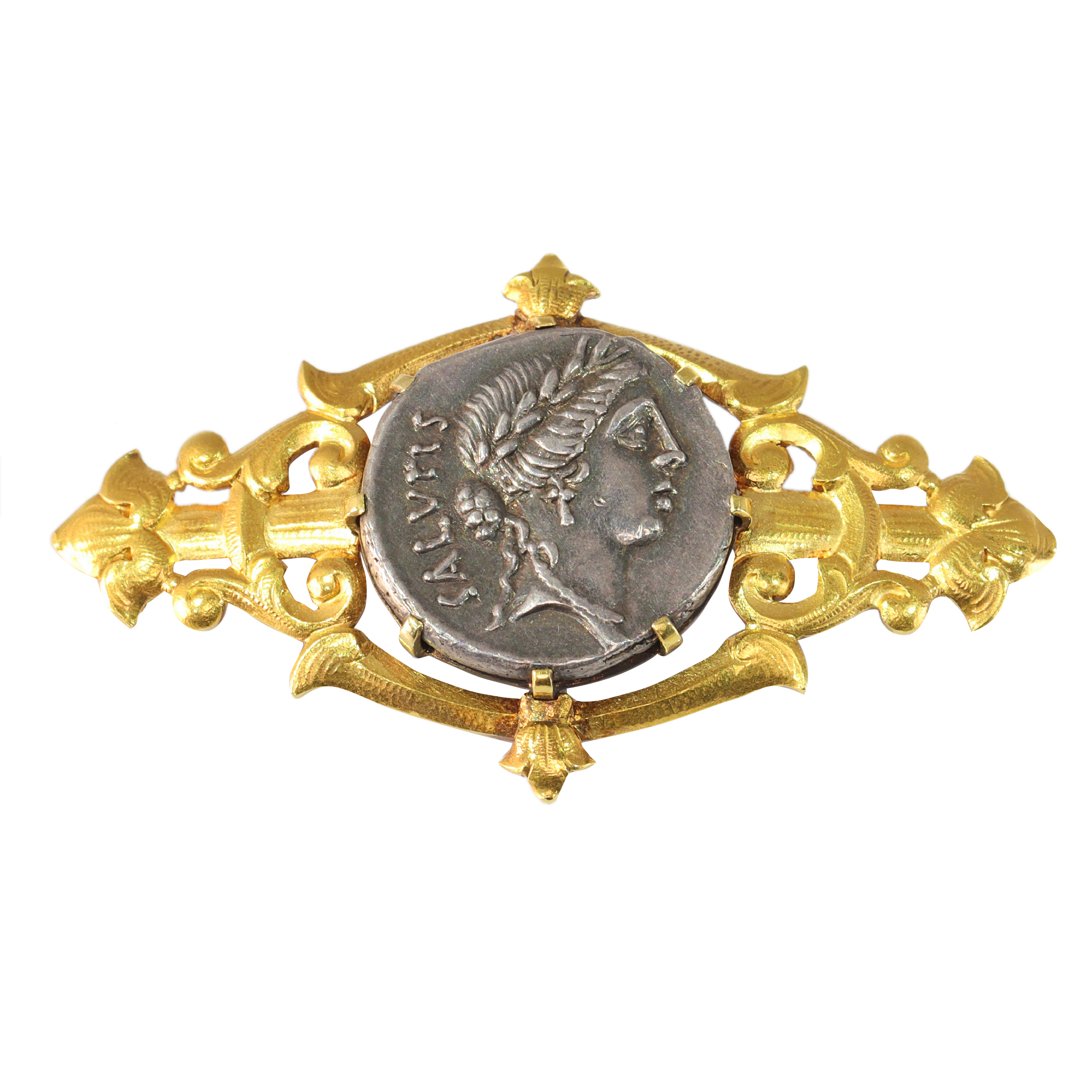Nous offrons des facilités de paiement pour le bijou de vos rêves. Demandez nous les détails. Expédition assuré gratuite !
Ancient silver Roman coin mounted in antique Victorian brooch
This brooch is a typical example of coin jewelry as made by Lucien Falize in circa 1890 (for examples see English translation of Vever on page 954 and further). The 18K gold mounting holds an ancient coin. As other jewels by Falize it reveals an impeccable taste, despite the deliberate use of Classical sources and the beautiful works of the Renaissance in particular, which Falize knew and cherished above all others.
The coin itself has been recognized as an original ancient coin from 54 B.C.!
Antique jewelry object group: brooch
Condition: excellent condition
- (more info on our condition scale)
Country of origin:
Although it does not carry any legible control marks we believe this to be of French origin.
Style:
Victorian - Victorian decorative arts refers to the style of decorative arts during the Victorian era. The Victorian era is known for its eclectic revival and interpretation of historic styles and the introduction of cross-cultural influences from the
middle east and Asia in furniture, fittings, and Interior decoration. Victorian design is widely viewed as having indulged in a regrettable excess of ornament. The Arts and Crafts movement, the aesthetic movement, Anglo-Japanese style, and Art Nouveau
style have their beginnings in the late Victorian era.
- See also: Victorian
or more info on styles
Style specifics:
The Grand Victorian Period - Experts divide the reign of Queen Victoria, also called The Victorian era (1837 - 1901) into three periods of about twenty years each; The Romantic Victorian Period (1837 - 1860), The Grand Victorian Period (1860 - 1880),
and the Late or Aesthetic Victorian Period (1880 - 1901).
We consider this to be of the Grand Victorian Period.
This second Victorian period is famous for its ostentatious pieces set with pearls and diamonds (from South Africa). From ca. 1850 wealthy English had reported about jewelry from India and Japan, which heavily inspired the jewelers of this period. This
period also corresponds with the death of Queen Victoria's husband King Albert making mourning jewelry (set with heavy dark stones) the type of jewelry specific for this period.
Period: ca. 1870
- (events and facts in 1870)
Description of coin: The coin represents the laurelled head of Santé (Salvtis). The back of the pendant shows
Santé leaning on a pillar and holding in the right hand a snake (Nv. Acilivs III Vir. Valetv.).
Remarks on the coin master: The coin, a new monetary unit, with Manius as first name, proofs that he doesn't carry
out his duty before approx. 700 (54 B.C.). In this era many historians were called Manius. One of them was Manius Acilius
Glabrio. He was the son of a very important person, he battled under the command of Julius Cesar during the Civil war, he
became many times governor.
Material: 18k yellow gold
and silver.
- (more info on precious metals)
Hallmarks: No trace.
- (more info on hallmarks)
Dimensions: 4.70 cm (1.85 inch) by 2.70 cm (1.06 inch)
Weight: 12.00 gram (7.72 dwt)
Reference Nº: 01198-2660
Copyright photography: Adin, fine antique jewelry
yellow gold jewelry,
latest acquisitions,
antique jewelry,
estate jewelry,
vintage jewelry or
modern jewelry
Jewelry with birthstones (or month stones) for:
January -
February -
March -
April -
May -
June -
July
August -
September -
October -
November or
December.
Additional information:
jewelry glossary -
wall of fame -
visit us in Antwerp -
subscribe to our mailinglist.
What is antique jewelry? -
What is estate jewelry? -
What is vintage jewelry?




